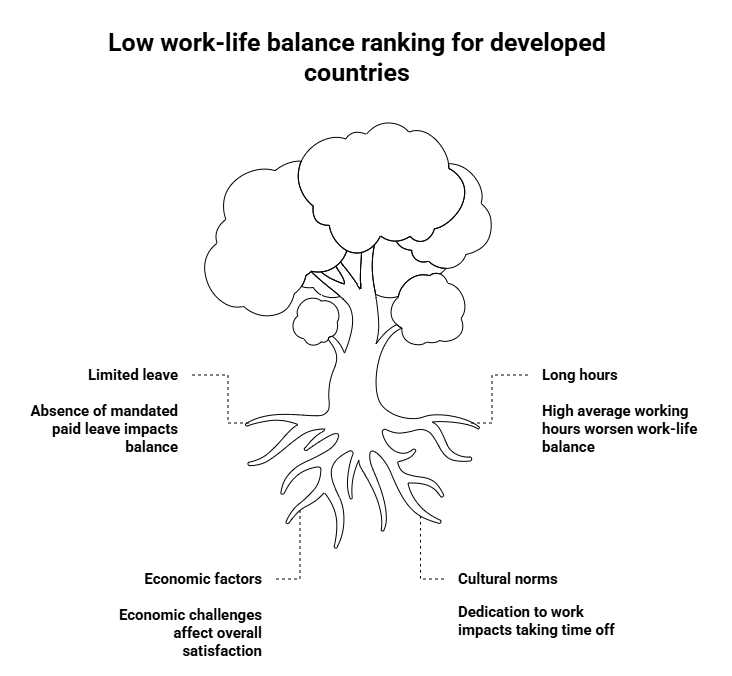Work-life balance remains one of the most important indicators of quality of life, shaping health, productivity, and overall satisfaction. In 2025, Remote released its Global Life-Work Balance Index, evaluating how developed countries perform in creating conditions that support both professional and personal well-being.
The index measures key factors such as statutory leave, average working hours, safety, inclusivity, and access to healthcare. The results reveal significant differences between nations with similar economic strength, with some highly developed economies ranking unexpectedly low.
This article presents the official 2025 ranking of life-work balance in developed countries from lowest to highest, based on Remote’s data, highlighting where each country stands and the factors that influence its position.
2025 Work-Life Balance Ranking for Developed Countries
This ranking focuses exclusively on developed countries, where comparable high standards of living, social infrastructure, and wage levels provide a fair basis for comparison. Some developed countries are not included due to the lack of reliable or up-to-date data, ensuring that only accurate and consistent information is presented.
25. United States — 31.17
The United States ranks last among developed countries in the 2025 Life-Work Balance Index. Contributing factors include the absence of federally mandated paid vacation days and paid parental leave, leaving such benefits to employer discretion. Average working hours remain among the highest in the developed world, and access to affordable healthcare is still a challenge despite ongoing reforms. While wages are competitive in many sectors, the combination of long workweeks, limited statutory leave, and uneven safety and inclusivity scores places the U.S. significantly behind its peers.
24. South Korea — 53.42
South Korea’s ranking reflects a persistent culture of extended work hours despite recent government measures to reduce them. Many employees do not fully use their legally entitled annual leave due to workplace expectations and competition. While the country has a strong public transport system and advanced healthcare, these positives are offset by high job-related stress levels and lower scores in life satisfaction. Government initiatives to promote flexible work arrangements are in progress, but the overall pace of improvement remains slow.
23. Japan — 56.54
Japan scores slightly higher than South Korea but still falls in the lower tier of the ranking. Although the government has introduced policies encouraging employees to take more paid leave and limit overtime, cultural norms around dedication to work remain deeply ingrained. An aging population and labor shortages add pressure to the workforce, further complicating efforts to shorten working hours. Safety and public services are strong, but these strengths are counterbalanced by ongoing concerns about overwork and limited use of rest days.
22. Singapore — 57.85
Singapore’s position is shaped by its long working hours and relatively limited statutory leave compared to other developed economies. The nation benefits from high safety ratings, efficient infrastructure, and competitive wages, but these advantages are tempered by the pace and intensity of work life. While the government actively supports skills development and career mobility, the emphasis on productivity often comes at the expense of extended personal time, impacting the overall life-work balance score.
21. Switzerland — 60.32
Switzerland ranks just above Singapore, with a score influenced by its comparatively modest statutory leave allowance despite high living standards. The country excels in safety, public services, and wage levels, but longer average working hours than many European peers reduce its standing. While Swiss workplaces tend to offer flexibility, the balance is still tilted toward work, particularly in high-demand professional sectors. These factors combine to create a ranking that is lower than some might expect for a country with such strong economic performance.
20. Italy — 60.52
Italy’s ranking reflects the contrast between its generous statutory leave and the broader economic challenges affecting workers. While employees benefit from a significant number of paid vacation days and strong protections in the labor code, regional disparities in wages and job security impact overall satisfaction. Economic stagnation in certain sectors and a slower pace of labor market reforms compared to other EU members contribute to a score that places Italy in the lower half of the list.
19. Greece — 62.84
Greece offers substantial paid leave entitlements and a legally regulated workweek, yet the country’s position is influenced by long-standing economic constraints and high unemployment rates in some regions. The cost of living has been rising faster than wage growth, and while safety scores are relatively strong, limited flexibility in working arrangements and the uneven availability of career opportunities affect the overall life-work balance assessment.
18. Sweden — 62.92
Despite its global reputation for progressive workplace policies, Sweden’s ranking in this index is lower than many expect. While parental leave and paid vacation allowances remain among the most generous in the world, recent cost-of-living increases and housing affordability issues have impacted perceptions of quality of life. Additionally, certain sectors have reported higher workloads due to labor shortages, which reduces the practical benefits of statutory leave for some employees.
17. Czech Republic — 63.06
The Czech Republic’s position reflects a mix of strengths and challenges. Employees have access to a decent number of paid leave days, and working hours are shorter than the OECD average, but inclusivity and wage competitiveness lag behind leading European nations. The manufacturing sector remains a significant part of the economy, and while it provides employment stability, it often involves work patterns that limit flexibility.
16. Poland — 65.33
Poland scores above its Central European neighbors due to gradual improvements in workplace protections and the availability of paid leave. The growth of the technology and service industries has introduced more flexible work arrangements in urban areas, but rural regions still experience longer workweeks and fewer career development opportunities. While wage levels are rising, they remain below the EU average, which continues to influence life-work balance perceptions.

Also Read: Ranking of Developed Countries by Local Purchasing Power Index in 2025
15. France — 67.62
France is known for its extensive paid leave policies and strong labor protections, yet its position in the index reflects ongoing challenges in workplace dynamics. While employees benefit from some of the shortest statutory working hours in Europe, high levels of job-related stress and recent labor market tensions have influenced the overall score. Economic competitiveness initiatives have also led to debates over working time flexibility, affecting how policies translate into daily work experiences.
14. Austria — 68.01
Austria’s ranking is supported by solid employee benefits, comprehensive social security, and reliable public services. However, the country’s average working hours remain slightly higher than those of top-ranked European nations, which reduces its overall score. Additionally, certain sectors, especially tourism and hospitality, operate with seasonal pressures that can extend working periods and limit the use of leave entitlements.
13. Portugal — 68.65
Portugal offers generous paid leave and a growing emphasis on work flexibility, particularly in urban and tech-driven areas. Despite these positives, wage growth continues to lag behind Western European averages, and regional economic imbalances persist. The country’s rising popularity as a relocation destination for foreign professionals has also impacted housing affordability, adding pressure to household budgets and influencing perceptions of balance.
12. Netherlands — 68.97
The Netherlands is often associated with a shorter average workweek and strong part-time work culture, which support its score. Nonetheless, high housing costs and increasing workloads in certain industries have prevented it from reaching the top tier of the ranking. While flexibility is widely available, not all workers can take full advantage of it due to sector-specific demands and skill shortages.
11. United Kingdom — 69.68
The United Kingdom ranks just outside the top 10, benefiting from statutory paid leave entitlements and employee rights that align with European standards. However, long commuting times, regional disparities in wages, and the cost of living in major cities continue to affect the overall balance. Economic adjustments following recent trade and policy changes have also influenced labor market stability and job security perceptions.
10. Finland — 70.86
Finland’s position in the top 10 reflects a strong commitment to employee well-being, with generous parental leave, paid vacation, and flexible work arrangements widely available. The country consistently scores high in global happiness rankings, yet rising living expenses and housing costs in urban areas have had an impact on perceived balance. Additionally, in certain industries, skill shortages have led to higher workloads, affecting how much employees can benefit from formal entitlements.
9. Spain — 71.94
Spain offers some of the longest paid vacation allowances in Europe, coupled with labor laws that protect working hours. Its ranking is supported by improvements in workplace inclusivity and the expansion of remote work opportunities. However, elevated unemployment rates in certain regions and wage disparities between urban and rural areas continue to influence the overall life-work balance score. Economic recovery progress has been steady, but not yet evenly felt across all sectors.
Also Read: How to Find What You Love To Do Outside of Work (With Examples)
8. Australia — 72.10
Australia’s relatively short average workweek, combined with one of the highest minimum wages in the developed world, contributes to its high ranking. Access to healthcare, strong worker protections, and a generally safe environment further support the score. Nonetheless, the cost of living in major cities remains a challenge, and some industries still require extended working hours, limiting the full reach of work-life policies.
7. Canada — 73.46
Canada’s ranking benefits from universal healthcare, workplace safety standards, and an increasing number of employers offering flexible schedules. Paid leave entitlements are reasonable, though fewer than in many European countries. The main factors preventing a higher position include high housing costs in metropolitan areas and seasonal job fluctuations in certain sectors, which can create periods of intensive work for many employees.
6. Denmark — 73.76
Denmark’s position reflects a combination of solid social benefits, well-enforced labor rights, and a generally manageable average workweek. Its strong focus on equality in the workplace and parental leave access helps maintain a high score. However, the relatively high cost of living and increasing workloads in specific high-demand industries keep it just outside the top five in the 2025 ranking.
5. Norway — 74.20
Norway secures a place in the top five thanks to strong labor protections, extensive parental leave, and a culture that supports reasonable working hours. The country’s high safety ratings and equitable workplace practices contribute positively to the score. While the cost of living is among the highest in Europe, high wage levels and comprehensive welfare benefits offset much of the impact, allowing workers to maintain a stable balance between professional and personal time.
4. Germany — 74.65
Germany’s ranking reflects a well-structured labor market where efficiency and productivity are prioritized without excessively long working hours. Employees benefit from statutory leave, job security measures, and clear labor regulations. The country’s strong industrial base is complemented by an increasing focus on flexible work arrangements, particularly in the service and technology sectors. Rising housing costs in major cities are a limiting factor, but overall stability keeps Germany near the top.
3. Belgium — 75.91
Belgium’s high position is supported by generous statutory leave allowances, comprehensive social benefits, and well-enforced labor laws. The country offers strong protections for employees in both public and private sectors, with regulated working hours contributing to overall satisfaction. While taxation levels are relatively high, they fund extensive public services, healthcare, and social support systems that enhance quality of life for workers.
2. Ireland — 81.17
Ireland ranks second with a combination of universal healthcare access, competitive wages, and solid employee rights. The country’s statutory leave policies are among the strongest in the English-speaking world, and workplace inclusivity scores are high. Rapid economic growth has expanded career opportunities, though infrastructure pressure in certain urban areas remains a challenge. Overall, Ireland maintains a balance that places it well ahead of most developed economies.
1. New Zealand — 86.87
New Zealand leads the 2025 Life-Work Balance Index with an exceptional combination of statutory leave, workplace protections, and societal safety. Employees are entitled to 32 days of statutory leave annually, one of the highest totals in the developed world. High inclusivity ratings, strong public services, and comparatively low average working hours further strengthen its position. The country’s consistent focus on policies that promote well-being makes it the clear leader in life-work balance this year.
The ranking highlights how work-life balance can vary significantly even among developed nations with strong economies and high living standards. Countries at the top demonstrate that supportive labor policies, flexible working conditions, and cultural priorities around personal time contribute to higher satisfaction. Those lower in the ranking show that economic strength alone does not guarantee balance, as workload expectations, commuting demands, and workplace culture play an equally important role. Overall, the results reflect how national approaches to work can directly shape the quality of life for employees.



